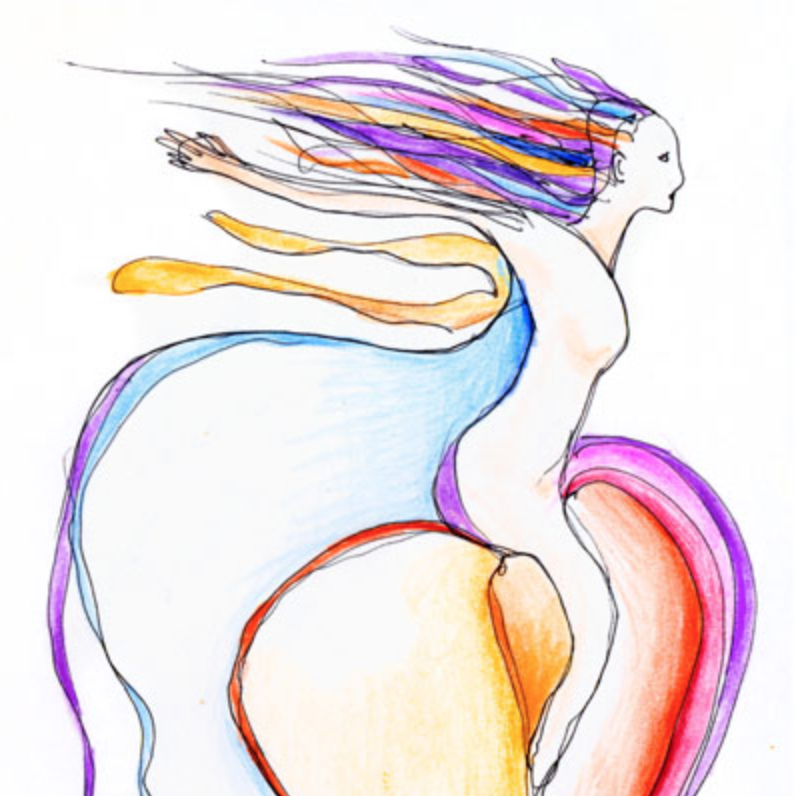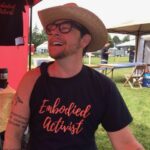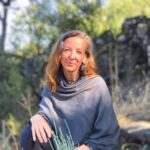
How to Restore Genital Sensations & Pleasure from Numbness & Pain Due to Medical Violations.
Share this episode:
Diane first reached out to me about 7 years after completing 8 surgeries to remove a polypropylene vaginal mesh that had torn through her vaginal wall, urethra and bladder. Because the mesh intertwines with the vaginal nerves, removing the mesh product, also meant removing her vaginal nerves. This left Diane with no sensations intra-vaginally. Blessed with an indomitable spirit and against the advice of her doctors, she researched and experimented with various alternative procedures until finally experiencing a re-generation of tissue growth from stem cell injections. We then engaged in a combination of scar tissue remediation – to restore nerve, blood and lymph flow, and stimulate new nerve growth by gently teasing out new sensations from within the newly evolving tissue. She shares her journey and what she felt were key factors in her restoration and reclamation experience.
Sophia was told by a business coach that up-leveling her business would involve unleashing her orgasm. Unbeknownst to her business coach, Sophia’s clitoris and inner labia were circumcised in a primitive manner when she was young. Although there was scar tissue to resolve from her childhood violation, there were also complex emotions to release from her body as well. Once she allowed and invited this release of her past from the tissues of her body, healthy organic sensations followed, allowing her to surrender into healthy full body vaginal orgasms.
Although both Diane and Sophia endured unimaginable physical violations, it was the permission each gave themselves to feel and process the unintegrated emotions associated with these traumatic events that gave way to the return of the organic flow of energy, blood flow, sensation and pleasure. They generously and courageously share their respective journeys of reclaiming their sexual wholeness and restoring their organic life force.

We explore:
“When I woke up from the surgery, I was shocked by how much pain I was in. I wasn’t expecting that because I was led to believe it was such a simple surgery. And as I woke up, my husband came into the room with a copy of the New York Times… and the warning was in the front page… about vaginal mesh.”
How the removal of the polypropylene vaginal mesh could only be done piece by piece, when the location of the mesh could be identified due to the pain it caused, requiring a total of 8 surgeries.
How waking up the touch receptors in one part of the body can stimulate and wake up the touch receptors of the entire body.
How scar tissue remediation can restore blood, lymph and nerve flow, increasing sensations and aliveness in any part of the body.
How integrating the emotional aspects of any physical trauma, including medical violations, can play a key role for the body to feel safe and trusting again to receive touch and honor its aliveness.
How being sexually violated by a trusted relative can elicit conflicting and confusing emotions in the body associated with pleasure, guilt and shame, affecting one’s sense of disconnect with their pelvis & genitalia.
How the body’s sexual sovereignty shows up in voicing its boundaries, consensual choice and preferences naturally and organically when it viscerally knows that it’s in charge of all of its experiences.
“Knowing that I was responsible for my own turn-on, I no longer projected that onto the man that I was with… I was able to then verbalize with the men that I chose to become sexually active with – ‘Hey, I need to go slow. I need you to touch me. I need time. I need more foreplay’ – And then that in turn created more safety.”
Rahi: Welcome to Organic Sexuality, where we explore the restoration of pleasure, the reclamation of sexual sovereignty and the realization of our embodied sexual nature. An invitation to honor the pleasures of your body by embodying the pleasures of your nature. I'm your host, Rahi Chun. I'm a certified somatic sex educator, sexological bodyworker and creator of Somatic Sexual Wholeness. Rahi: Today's episode explores processes for restoring healthy sexual function and embodiment after traumatic physiological altercations to the genitalia. Both of today's guests generously share their courageous journeys of reclaiming their sexual arousal and pleasure patterns -after, in Diane's case, the insertion then removal via eight surgeries of a polypropylene vaginal mesh, and for Sophia, the experience of healing from childhood female circumcision. Despite the physical altercations to the erogenous anatomy, both share how critical it was to honor and hold space for the emotions associated with these experiences, in addition to resolving scar tissue and restoring the innervation that had been affected. Please be advised that both guests share in detail medical violations involving the genitalia, which may trigger strong reactions. Rahi: Our first guest, Diane, describes in her own words, how a polypropylene mesh implanted on the recommendation of her doctor quickly tore through her vaginal wall, urethra and bladder. She shares how removing the mesh that had intertwined with her vaginal nerves required eight surgeries and a reconstructed vaginal canal, leaving her with no sensation - and how after many years of accepting that she would never feel vaginal pleasure again, she found a path for restoring and reclaiming her sexual embodiment. Diane: In 2008, I had a very mild bladder prolapse. And at that point, the doctor said, Oh, you really should get this fixed before it gets worse. You're young, you'll heal really quickly. It's no big deal, you're in and out of the hospital in a day or two. And you know, it's something I think you should do. Um, I was very new to surgery. I had never had a surgery before. And so I didn't know to get another opinion. I didn't know,to talk to other people. I didn't know to research what would be involved. I just kind of took my doctor's word that I needed the surgery, even though I didn't have any incontinence, I didn't have any pain. I didn't really have a reason to do it. Um, but it, I just thought since he suggested it, it was something I'd better do. Rahi: And this was a doctor who you had a long history with.... Diane: Yes, he delivered my four children. And I, I, I thought he was really good, really smart. And if he suggested I do this and he had me go to Yale and I thought, Oh, well Yale has to be a great place to do this, so I am going to do it. Rahi: So, um, in whatever ways you feel comfortable in sharing, um, what was your experience of the vaginal mesh once it was, um, inside of you. Diane: Okay. So when I woke up from the surgery, I was shocked by how much pain I was in. I wasn't expecting that because I was led to believe it was such a simple surgery. And as I woke up, my husband came into the room with a copy of the New York Times. It was October 20th, 2008 - and the warning was in the front page of the New York Times about vaginal mesh, and he showed it to me, and then when the doctor walked in with his resident, I said, why didn't you tell me this? And he said, well, I thought you'd want to do it anyway. So we didn't tell, didn't tell you about this. Rahi: That's like a scene from a movie... Coming out of surgery... Diane: Exactly... Literally, as I woke up, my husband handed me the New York Times, the article on the front page. So, you know, that was the first inkling I had that something could go wrong. So, you know, I went home from the hospital and I continued to be in a lot of pain. And then I started getting lots of bladder infections and, um, I wanted to go back to the doctor, but he was out having his own surgery. So I saw some resident who really didn't know what was going on. So then they said we could try sex at six weeks. And since I was still in a lot of pain, we waited until eight weeks. So my first sexual experience with mesh in, my husband came into me and he pulled out yelling because the mesh had scratched him. The mesh had already come down through the vagina. Diane: So went back to the doctor a couple of weeks later and he was like, Oh, that's easy to fix. We'll just cut the pieces of the mesh that are coming through the vagina. And then, then you should be fine. So I went back for another surgery at Yale, with this doctor who cut the mesh - and then that made it worse because now the mesh was kind of traveling through the pelvis. And, um, I was in so much pain, went back to him and he was like, well, we can put the mesh in, but there's no way to get it out. Rahi: He's telling you that now. Diane: He's telling me that. Yeah, you can't take it out. It's like, it's like concrete. Like you've put something into concrete and you can't remove it. So he had no idea what I should do. And I remember that was like around Easter of that year. And I remember going into the bathroom and thinking, you know, I want to end this pain. You know, I almost was suicidal. I was in so much pain. And then I started my own research, which has been the key to everything just finally saying, okay, I don't believe there's not somebody who can help me. And I found a doctor at UCLA who literally was the only person in the world who had an idea how to get it out. And I went to see him and he was like, yes, I can help you. I can get this out, but it's going to take a lot of surgeries and a lot of years, but we're going to take it out piece by piece. And at that time they couldn't visualize it. So they couldn't just go in and take it out. I had to wait for a piece to cause pain. Rahi: Right. So, so that was a long process. Diane: That was a long process. That was from 2009 to 2012. Rahi: And so every time there was some pain you would fly down from Seattle and undergo surgery. Diane: Right. But it wasn't that easy because this doctor became so well known that he was booked up for months. So the pain would start and I'd have to wait maybe six months to get an appointment, to have surgery. Rahi: So just endure the pain. Diane: So you just kind of lived with the pain, waiting to get it out. Rahi: I'm like trying to imagine what. Diane: So that, yeah. You just try to live, try to survive, try to, because after each surgery I would be without pain for a little bit. Rahi: Mm. Until the, a new part of the mesh... , Diane: Until a new part came through. Like there was one piece that went through the bladder, and one piece that went through the urethra that caused the most pain. And um, so it was a long process. Yeah. Rahi: Yeah. And I'm guessing during this time it was sexual intercourse was not possible. Diane: No, at my first surgery, because the mesh had totally taken out the vagina. It was like two inches long. At that point I had to have a whole vaginal reconstruction. So it was like, I had, I didn't have a vagina. I had a box that had no nerves, no fat, nothing. It was just like a box. That's all that, that's all that it was. Rahi: So after each little piece of mesh would be identified due to the pain, you would come down, you would have it removed. Was it about eight surgeries? Diane: Yeah. It took about eight surgeries. Rahi: So, then after the eight surgeries, uh, when Dr. Ross felt like everything was removed, what was the healing journey for you from that point on? Diane: Well, at that - initially, I guess in 2012, he had finally developed a way to see if there was more mesh and, um, he could do it at that point by MRI and ultrasound. So in 2012, he said, I think we have it all. I don't see anymore. And I said to him, well, I don't have any feeling - will I ever have feeling? And he said, probably not because we've taken out all the nerves. Rahi: So, I remember from the documentary that the mesh actually intertwines with the nerves within the vaginal canal. So removing the mesh actually removes the nerves as well... Diane: Yeah. Exactly.. When you remove the mesh, you take out nerves and tissue. And so, Rahi: So at the end of the eight surgeries, um, he, he, it sounds like he was in doubt as to whether you would restore sensation. Diane: Yeah. He didn't think I'd have any sensation at that point. Rahi: So, you know, for listeners, I really want people to understand what is possible because I'm guessing that you were just in a, I mean, what was it like, were you in despair? Were you in acceptance of it? Diane: Well, I'd always been a very sensual sexual person. So for me, this was really, really hard because I had always loved sex. And to know that I probably would never have it back or have feelings was really hard for me, but I kind of accepted it. And as you go along without sex, you somehow kind of stop thinking about it as much. So from 2012 to 2017, I just - I had sex with my husband once in a while, but I didn't have any feeling. And it wasn't, wasn't a good experience. And in fact,, I'd get angry because he was enjoying it. And I wasn't. So, um, like in 2017 I had a massage and for the first time I had some feeling. And that day, I said, I am going to get it back. I'm going to do whatever it takes to get this back. Cause I, I have, I do have some feeling I want to get more and I'm going to figure this out. Rahi: Great. Now had you done anything between 2012 and 2017. Okay. So, uh, I mean, I'm guessing part of it was probably time, you know, for the, um, just for that, the body heals itself, part of it I'm, I'm guessing was the skill of the masseuse, perhaps. Yep. Yep. So there was sensation and from then on, um, what, what have you tried that works? What have you tried that was a waste of time? Like, and what advice would you give to listeners who may be in a similar situation where they've had some sort of surgery have lost sensation are in despair or doubt and are wondering what, what could they try? Diane: You know, I think the first thing to do is try to wake up your body through touch. And at that point I started to have a lot of massages and I just realized I needed to be touched at that point. And that kind of, that woke me up. Just, just having some regular, every week massages, just, just to be touched, that was kinda the first step. Um, and then I realized that wasn't going to be enough. And I thought I need somebody to really, really work with me and, and wake up my body. So I started to explore everything. I think I started with, um, sensual massages. So I started to explore some of the women and men that were listed under sensual massages. And, and that was really, really helpful, really helpful. Rahi: I'm guessing that just, as you alluded to earlier, the importance of waking up your sensory, your sense receptors through touch, I mean, we know that the body is all interconnected, so as one area wakes up, it really affects kind of the whole grid. Yeah. Diane: And then I tried a lot of medical things. I did the O-Shot - not too helpful, really painful. Um, I did all kinds of lasers, every kind of vaginal laser that came out I would try - maybe a little helpful. Um, and I did XO-somes, which was expensive and not too helpful. And then I did, I had been investigating STEM cells for that area since 2009 and had talked to Dr. Ross about it, like way early in my surgery with him. And he said, it's too experimental. Don't do anything more to yourself. You don't know what, what could happen. So by 2019, I found a doctor who, two doctors who would do STEM cells. And I did a large amount of that. And that was really helpful that added, I think, blood supply and just some fat and tissue to the Vagina. Rahi: Cause it sounds like, I mean, by the end of all your surgeries, like Dr. Ross said, or like, you said, it was, it was a box. Diane: It was just a box. Yeah. Nothing there, Rahi: Nothing there, no, the nerves have been taken out. I mean, so Diane: Fat's gone. Literally. - It's nothing, just massive scar tissue. Rahi: Yeah. So there's massive scar tissue and a lack of, um, really soft, healthy, vibrant, like pulsating tissue. Diane: Exactly. Exactly. And at that point I hadn't had an orgasm - since before the surgery and you know, I'd given up hope for that. And also a lot of self-pleasure with vibrators and anything, I would try anything to get some blood flow. I think that was critical. Yeah. Rahi: Yeah. Yeah. So then the STEM cells, it sounds like it was a bit of like, like taking a risk, cause it was a wild West Diane: Wild West and FDA not approved. Right. Rahi: Um, but you were doing your research, you were doing your homework and you went with these two doctors and there was, uh, it sounds like sensation was being restored. Yeah. Okay. Was that around the time that, that you found me? Diane: Um, exactly, exactly. 2019. Yeah. Yeah. And then, you know, I was, I, I found your website. I, I feel like there's a hand guiding me to these people are literally, if I look something up on my computer now, the right person just appears for me. So your name came up and I thought, it sounded interesting. And then I knew at the intake that you are going to be different than everybody else, because you took such a detailed history. I knew it was, it was totally different. Rahi: I think you were in your car - after a workout.. Diane: I was in my car where I have my only privacy. Um, but I knew I knew everything was going to be different. I felt very confident that this was going to help. And I think my sessions with you, they're, they're just so important and so special, but they've worked so well on kind of breaking down scar tissue and getting the blood flow back. Rahi: Scar tissue has the effect of blocking blood, lymph, and nerve flow and thus sensation and can be resolved by a variety of palpation techniques. For Diane, we began each session with vaginal steaming to increase blood flow within the regenerating tissues of her vaginal canal, relax pelvic floor muscles, and down-regulate her nervous system. Inserting a castor oil-dipped, organic tampon and intra-vaginally for at least 20 to 30 minutes, followed by gentle and methodical palpation to tease out new sensations, allowed the healing properties of the castor seed to penetrate the tissues, having the effect of breaking down scar tissue, further increasing blood flow and stimulating sensation and nerve growth. Like any release of armor and trauma from the body, holding space for the unintegrated memories and unexpressed emotions held in the tissues and fascia of the body was also key for restoring healthy and pleasurable responsiveness. Diane: And then there's just a psychological component to that too, of feeling like taken care of and somebody who really understands my body and what it needs and what it's going through. Rahi: You share that now, I'm realizing that it's probably highly, highly clinical and medical, um, all the procedures and does not take into account, um, your, your feelings, your emotions, kind of all of the experiences, right? Diane: Yeah. My experience with the doctors is I go in, it's a very, it's usually painful having STEM cells injected or, you know, they sometimes do it by taking out fat, which is a painful lipo procedure. And it's very, very clinical. No one's ever asked me about, you know, my relationship with my husband or what sex is like for me now before or after it's, it's just very, you know, it's like, like an auto repair kind of thing. Like you're fixing the car. So there's nothing about the emotional part of it. Yeah. I think from 2009 to 2017, I was just kind of going through the motions in my life there wasn't that spark or that joy or that energetic feeling. Um, I think colors weren't as bright. Yeah. Just had lost a part of myself and getting it back. It's just like, I'm a new person. Diane: It just feels like I have so much more energy and joy and everything's better, but I had no idea that my sexuality could mean that much to me, but it really, really does. Yeah. I feel like I have a new, a new vagina, you know, it really feels like it used to. And I had no hope with that. Literally. No hope. Now my sessions with you have definitely been, what's made the difference for sure. It's kind of brought everything else together, you know, it's, it's bridged the medical parts with the STEM cells and the emotional part. Um, Diane: Yeah, the emotional part is it's really huge, you know, like, you know, you can get the massages and things, but just feeling like there's somebody who understands what the whole trip has been. It's really pretty amazing. Rahi: For an in-depth understanding of how - in the world, the vaginal mesh was approved, brought to market and supported by the medical industry, and then thankfully removed from the marketplace, check out the excellent Netflix documentary, "The Bleeding Edge." Next we hear from Sophia whose physical altercation and subsequent emotions were very different than Diane's yet the space holding for the resolution shared similar principles. Female circumcision is tragically, still common in some cultures. What compounded the shock to the body was that it was Sophia's beloved and trusted grandmother who took her to the practitioner who mutilated her genitalia in a primitive manner. Compounding her relationship with her genitalia and sexuality. An older cousin seen as the golden child of the family had previously sexually violated Sophia, leading to confusing emotions about her sexual embodiment, as she describes in her own words. Sophia: Uh, there was, a period of incest with a cousin and that set up a whole, you know, this whole thing in my system of it feels good. It shouldn't feel good - sex and guilt. Um, not knowing if I could trust my body. Why do you, how are you liking this when you're not supposed to - this is wrong? Um, and, and again, that message of my body is something to be used,, to, you know, to allow that, to continue to protect my sister from having it happen to her, uh, later only to find out that he had his way with her as well, just, you know, that betrayal. Um, and of course the, the final, the major one would be circumcision. I come from a country in Africa where female circumcision is still or was still performed and being there over the summer visiting my grandparents, going to the clinic with what I thought was just to support my grandfather getting a shot. Sophia: And, um, yeah, just being swept up onto a table and having this most intimate part of my body that I basically didn't even know existed. Um, being introduced to, you know, a 1920s razor blade, one of those almost flip switchblades, um, and having the worst pain of my life and a part of my body, I barely knew existed until that moment. And then watching this man walk over to the window and throw out a piece of, you know, the most intimate piece of my body, the clitoris out the window - only to hear the dogs fight over it. You know, again, the message was your body is not yours. Your body is dirty. Your body is something to be used and controlled and contained. So all of those things were formative. Um, you know, and, and then being raised in a very strict Muslim tradition where my first boyfriend wasn't until graduate school. Sophia: So yeah, what kept me going was that I was blessed with the ability to orgasm just from, uh, self-pleasuring or touching my nipples on my breasts. And again, because I was so sheltered, I just assumed all women had that ability. And, um, and so when I did learn to self-pleasure and masturbate, that was my go-to. And, um, ultimately when I was with my first boyfriend at 21, um, you know, I enjoyed the penetration, but definitely that's not the way I was able to orgasm, but I knew before I ever heard of what you do know, it's like, there's, my body is meant for pleasure. It's not meant to be constantly on this edge of, of guilt and pain. Rahi: Is that to say that your sexual experiences, when you did meet your boyfriend at 21 and started having consensual sexual experiences, that your experiences were a mixture of pleasure with guilt and pain? Sophia: Um, yeah, there, there was definitely because of the circumcision, there was scar tissue and especially in the early days when I would first become turned on, there would be pain as I guess the tissues would stretch. Um, and so it was always a matter of getting past the pain into the pleasure, for sure. Each experience where I took that leap of faith and followed my guidance and trusted myself and took a chance on me, really was building that muscle - towards the point where I could then listen to that guidance at a business seminar in Morocco saying that the next evolution in level of my business is to unleash my orgasm. I was like, what? And I remember seeing testimonials from three women that I know on your website. And I was kind of stunned like, Oh, this is like a secret in plain sight. Um, and then I reached out to you and, um, from there, you know, the rest of history. Again, I trust my intuition and what feels right, and since a lot of the trauma in my past was perpetrated by men, it somehow felt fitting and right that the healing could also come from a man. Rahi: Yeah. It's well, that's wonderful that your intuition was really that clear for you and also really remarkable that you recognized what kind of healing could happen, um, given that the perpetrators of your past trauma were men, um, and the possibility of rewriting those stories. I'm curious, what really stands out for you as having had the most impact in your journey of reclaiming your sexuality, Sophia: You know,, in working with you. It was, I don't remember the names for each of the different modalities that we used, but I think it was the trauma release where, you know, I was kind of blown away cause I'm like, wait, I'm here to do sexual healing bodywork, but I'm going to be fully dressed for like the first, second, third, however many sessions it takes. I'm like what? That, that kind of blew my mind a little bit because my type A was like, come on, let's do this. And yet that would have been dishonoring. Um, and so I think the trauma release where you knew you had me clench the muscles and do the different exercises and then allow my body to let go. There was no words for that. And it was really great because I'm really good at mental masturbation. Sophia: I can stay in my mind all day and still get nowhere. And so it was great cause it bypassed my mind. And I just remember, I think at one point just laughing like a mad woman on the ground and not knowing why I was laughing and yet it just felt like such a release. And I don't, it was nice to know that I don't even need to know what trauma is leaving my body. I don't need to constantly like - my scared little girl that wants to control everything...it's like, you don't have to be in control. It's okay too. You don't need to know why just let it go. So that was, that for me was important. Rahi: And you did - you were able to really let go of that? Um, that was the trauma release exercises, you know, I remember it was, it was within the same session before you just kind of burst out laughing. Um, before that there were a lot of tears and anger that were coming out of your system, and it felt like after the tremor mechanism was releasing whatever stored emotional energy - what was underneath that was just this, this laughter, which was really, ecstatic. Sophia: Yeah. Yeah. I felt like a crazy woman, but I was like, all right. And, and that's the other piece that I think prepared me to work with you is that I decided to let go of pride and ego, like nothing was more important than me living my best life. Rahi: Yeah, that's wonderful. Um, so yeah, that was, I don't know if that was like the first or second session, but yeah, the, I think the first three sessions were just the nervous system re-regulating - the TRE and the neuroaffective touch. Um, Sophia: The other - there were three other pieces that really were like highlights for me in the journey. Uh, one was the vaginal steaming. I was like, you want to put what, where I was like, I'm sorry, hot stuff shouldn't be anywhere near my pussy. Like, no, that's not okay. Um, but it was really interesting to actually trust my body and feel into it. It was just such a, it relaxed a lot. And actually, I don't know how or why, but I do think it made a difference to releasing some of the final pain in the scar tissue from the circumcision. Rahi: Yeah. I don't know if you recall, but I had asked you to apply some castor oil, um, around your clitoral complex and Castro oil is just it's. Uh, the properties of it are known to increase blood flow, to resolve scar tissue. And so the effect of the steam, um, allows those properties to penetrate through, uh, the tissues of the scar. Sophia: I remember that, and after that, I bought some to use at home because it was like, it's really nice. Rahi: Yeah. I remember you sharing with me. I remember you being just like a raised eyebrow as to whether, you know, but then I remember the, the day before the next session you had either texted me or called me and asked, ask to have that ready. Sophia: Um, that's right... Rahi: I think, I mean, from what I recall, you started to experience more sensation, more, more in your genitalia and your pelvis than, than you had previously. Sophia: Yeah. Yeah. It made a difference. And I could tell a difference in between those sessions. I'm trying to think there were two other pivotal moments for me that stand out. And again, I think it's that neuroaffective touch where I'm lying fully closed down the bed, and then you're basically having me tune into my body and how it wants to be touched or supported. Um, and I just remember the moment... Well, first of all, it was kind of weird and bizarre. I'm like, okay, like I have to tune into my body moment by moment, by moment, like in my life, I'm used to just tuning into it for a moment and then ignoring it for hours, so that in itself was a paradigm shift. Um, and I remember asking that my left shoulder blade wanted support. And again, I'm fully dressed on the table. And I remember you put your hand behind my left shoulder blade and I just started sobbing. Sophia: And I just, I was like, it was literally the first visceral experience of a man having my back, literally of being supported. Yeah. So I'm getting, it still brings me to tears. Just like what a simple thing. There's no way my conscious mind could have said, Rahi, this is what I need for sexual healing - I need you to put a hand behind my shoulder blade, and yet, because you kept guiding me back to myself and my body, it also reinforced that my body has a wisdom - that as much as it's been beat up and put down and traumatized, like it, it just wants to live and be happy. Rahi: Sure. And it was so skillful of you to listen to what your shoulder blade wanted in that moment, and then to have the courage to voice it, and then be open to receiving what it is that your body wanted. I mean, it really, it was a turning point. It was huge. Rahi: The area Sophia's body asked for me to support next to her left shoulder blade also happens to be the backside of the heart center, and hands placed on the backside of the body, such as this tends to provide a sense of support for that area - in this case, her heart. After asking for and receiving the support behind her heart center, Sophia unexpectedly purged - much like in a plant ceremony, physically and energetically. It was after this purging, that significant sensations within her pelvis and genitalia returned, allowing for her body to experience vaginal orgasms so that she no longer had to rely solely on her breast sensitivity for her arousal and pleasure as she describes. Rahi: Cause I remember there was one session. I don't remember which one, but you gave your body a lot of time to wait before asking for touch. And I don't know if it was 30 minutes or 40 minutes, but it was quite a long time. Sophia: It was like 45 freaking minutes. And I remember I was freaked out, but I think that was like the next step. And I was finally, you know, naked on the massage table, face down, covered with a sheet and my mind wanted to be like, okay, let's go. But when I tuned into my body, it was like, not yet, not yet. And I remember in my mind thinking, Oh my gosh, I'm paying for this - time is going by, like I need to do something. And it was such a pivotal moment too, because it was, again, the experience of being naked covered only by a sheet, in a room, with a man and to be safe. Like to me, that was an oxymoron. In my path - to be naked in a room with a man was to be quote unquote, asking for it. Sophia: Or, you know, as my mom had said, at one point in the past, you deserve whatever happened to you. And that was just for kissing a man, let alone, you know, laying naked in a room. So there was this, it actually was the thing that I needed most was the visceral experience of being safe and that my, - what my body wants in any moment comes first and that I can change my mind at any moment. And it's still okay. Like I could say, yes, let's start, and five minutes later, go no, stop. And it was like, really, this is okay. Like I'm not going to get beaten up, put down, talked down to - whatever it is - called a tease, all the things it was, it was truly a healing moment for me - or a healing forty-five moments. Rahi: How wonderful that you had that communication channel open with your body and that you could listen and choose your - to put what your body's needs as you know, as first, rather than what your mind, you know, all that mind chatter, because all that mind chatter, I mean, it's happening to us all the time, you know, the rationale and all that, but you really chose to put your body in the driver's seat and it sounds like that was, um, you know, it's, it's interesting. It's almost like the body needs evidence or proof that it is in charge or that it can be safe. Um, and I'm so glad that, Sophia: And you gave me permission. I remember voicing that to you. And you said to me, it's okay. I've had sessions, where it's three hours of - don't touch me. And I was like, really? This is okay. So, you know, it took me voicing my discomfort. And you kind of giving permission or validating. No, like hearing you say, no, I'm not, I'm not angry that I'm standing here in the corner waiting for permission. I'm like really like that, that was very freeing. I would say for me the other, the biggest thing was by the time I was ready to do, you know, the pelvic work or the Dearmouring, or to actually have you touch me, you know,, inter-vaginally or the stimulation, it was just like, it was, it was safe and I trusted you and I trusted myself and I knew the parameters and I knew the guidelines and the boundaries. Sophia: It was like, Oh, okay. It was safe. And for me it was, and again, I don't know, I don't have the words for what you do, but helping me re-map where all of that pleasure that I used to get just from my breasts or my nipples. I'm like, it's like having my vagina come online and my clitors, it was just like, Whoa, like if I thought an orgasm was good before, it was like, Holy cow. And now even if I do self-pleasure, you know, it's like my breasts feel good, but it's like, my clitoris and vagina are like, Hey, I want in on the game too. Um, and I can't remember if it was after the second or the third session. So I think we only did three sessions last year, but that was, that got me where I was ready to go. And, um, I remember walking out and being turned on and wet for like three or four days after that. Sophia: Um, and I was like, Holy cow, like, is this what teenage boys feel like? Where, you know, a good stiff breeze gets you turned on? I was like, Oh, it's just kinda nice, distracting, but nice. And then continuing to do the work, releasing the weight, feeling safe in my body. When I came back to see you, I guess, last month and being ready to relinquish control. And my next thing was okay, I want to know what it's like to have multiple orgasms and to no longer be like, No, I don't want it to come from my breasts because that's a bad thing. It's like, no, this is all part of the pleasure buttons that I was given. So I just, you know, to have practicing with safety and boundaries and listening to our bodies and tuning in more than once an hour or once a day, you know? Rahi: Well, yeah. And that's, that's a lot of, I mean, those are really, really important points. Um, Sophia is to really place your body as a priority, listening to your body and placing its wants as the primary driver so that your body does feel safe and that it is in charge of what you receive and what you - voicing what it is that it wants to receive. Um, so I'm curious. Um, so the sessions we did were about a year ago, and then we had a check-in about a month ago. I'm curious, how the integration process had been for you over the past year and what you notice about your body that's been different? Sophia: Well, the nice thing is I didn't have to make a conscious effort to do an integration process. It was like we did what we did and my body just went from there. Um, I think it flowed over into all areas of my life because I was dating and, you know, part of that whole old sexual trauma was the discomfort of going past third date without having sex. But as a result of our work together, it was like, no, like I could tune into my body and go, no, not yet. And knowing that I was responsible for my own turn on, I no longer projected that onto the man that I was with. So if I'm on a date and I'm getting turned on, that's great. And he's not the source of my turn on, he's only one source. Um, and I was able to keep connecting with my body and go, no, I don't want to have sex with him yet. Sophia: No, I don't actually know this man yet. No, I, I don't feel safe yet. Um, you know, or I do feel safe and I was able to then verbalize with the men that I chose to become sexually active with, Hey, I need to go slow. I need you to touch me. I need time. I need more foreplay. Hey, I need you to, you know, breasts are off limits until I'm ready, or I give you the, the, like, it just changed my confidence and my trust in my body and my ability to communicate it. And then that in turn created more safety. It was a self fulfilling prophecy because now I trust myself. I don't have to try. I don't have to trust the man I got, I've got me. I can trust myself. Um, and so that translated to confidence in so many ways. Rahi: So it sounds like you've got your own back now. Sophia: I love the way you just put that. Yes, yes, yes. Rahi: For listeners who may have had similar experiences, both Diane and Sophia share their advice Rahi: For listeners who - like the advice that you have for this, because you've been on such a journey. The advice that you have for listeners who may have had a medical procedure that resulted in either an increase in pain, a loss of sensation, what kind of, what would you like them to know? Diane: Well, I say the first thing before you do a procedure, just research it to death, to find out if you really need to do it and look at - are there different ways to do it that might help your recovery? It might, just might not lead to so many issues. So be careful get different opinions and don't rush into anything which I did. Um, then the other thing - don't think you're too old for sex. Don't give up. Don't think you're too old. Don't think it's hopeless. Don't listen to doctors who tell you that - Well, there's nothing else you can do, you know, we've done it all. Do your own research, go outside the box. Follow the leads. You'll meet one person who will lead you to another person. Sophia: I mean, the very first thing is to have compassion. Um, and to treat that part of you the way you would, if it was your child or someone you love, because many times we're so mean to ourselves mentally, logically, we know it's trauma, but they're like, get over it and spend so many years - what's wrong with you when we would like, never speak that way to someone that we love. Um, so compassion. And also owning it, I think with like the first step to be able to say I'm broken, but to use that as an empowering place. In the past, I would say I'm broken, but it was more of a victimy - woe is me, I'm never going to be fixed. Whereas it's like, okay, yes, I'm broken. And it's like stepping on the scale. If I don't know where I'm starting, I can't fix it. But to come at it from a neutral place of, okay, there's this thing that's not working for me. Um, and taking back the power. Um, so yeah, owning it, being kind to yourself, there's so many ways to do it, but the trauma release, I think, was huge and reaching out to someone that you trust and just know that you're not alone. Rahi: We know that unexpressed emotions live in the body, but even with physiological obstructions, it's vital to invite a safe space for emotions associated with the events of the physiological trauma to be felt, expressed and honored - in addition to addressing the physiology of scar tissue remediation and regenerating tissue and nerve growth as necessary. Rahi: Are there parts of your body that endured a physical shock or trauma that may have emotions to express. Or perhaps a violation of your boundaries involving your breasts, pelvis, or genitalia that are calling for your attention? How would it be simply to listen - with your hands, with your heart and your compassion. How would it be to support these parts of your body and listen for what they have to share with you? Links to scar tissue remediation, neuroaffective touch and vaginal steaming can be found in the show notes of this episode@organicsexualitypodcast.com and as COVID restrictions, continue to lift here in Los Angeles, the frequency and format of this podcast will continue to evolve. Feel free to register to receive updates@somaticsexualwholeness.com. Stay safe, stay sexy and stay true. And until next time, take good care.
Enter your name and email address below to receive insights behind each Organic Sexuality Podcast episode and the ebook Organic Sexuality, 5 Elements to Restoring Natural Pleasure And Sexual Wholeness
Get Podcast Updates
Featured Episodes
With some of the wisest Somatic Sexologists in the Field.
Dr. Aline LaPierre
Creator of Neuroaffective Touch Therapy and author of Healing Developmental Trauma
Mike Lousada
Creator of Psychosexual Somatics Therapy and author of Real Sex
Susanne Roursgaard
Psychotherapist/Sexologist/
Devi Ward Erickson
Founder of The Institute of Authentic Tantra Education

Dr. Liam Snowdon
Co-Founder: Somatic Sex Educators Association
Kimberly Ann Johnson
Author of The Call of the Wild & The Fourth Trimester
Dr. Ellen Heed
STREAM: Scar Tissue Remediation and Management
Keli Garza
Founder of Steamy Chick & The Peristeam Hydrotherapy Institute
Kris Gonzalez, L.Ac.
Founder of The Way of Yin
"Coocky" Tassanee Boonsom
Founder of Loi Kroh Traditional Thai Massage School
Dr. Betty Martin
The Wheel of Conset & Author: The Art of Receiving and Giving
About the Show
We explore the restoration of pleasure, the reclamation of sexual sovereignty, and the realization of our organic sexual wholeness. We engage with leading somatic therapists, sexologists & sexological bodyworkers, and holistic practitioners worldwide who provide practical wisdom from hands-on experiences of working with clients and their embodied sexuality. We invite a deep listening to the organic nature of the body, its sexual essence, and the bounty of wisdom embodied in its life force.

Rahi Chun
Creator: Somatic Sexual Wholeness
Rahi is fascinated by the intersection of sexuality, psychology, spirituality and their authentic embodiment. Based in Los Angeles, he is an avid traveler and loves exploring cultures, practices of embodiment, and healing modalities around the world.











